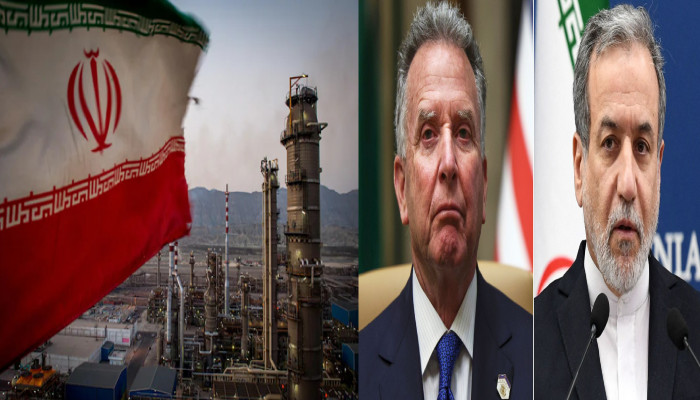Iran-US nuclear talks advance to expert stage, shows progress yet no agreement made
- In Reports
- 03:32 PM, Apr 22, 2025
- Myind Staff
Negotiations between Iran and the United States about Tehran's quickly advancing nuclear program are moving to the "expert level" on Wednesday. This shift indicates, according to analysts, that the talks are progressing quickly.
However, experts not directly involved in the discussions, who spoke with The Associated Press, caution that this doesn't mean a deal is close. Instead, it suggests that the talks between Iranian Foreign Minister Abbas Araghchi and US Mideast envoy Steve Witkoff have not fallen apart. The talks likely involve Iran agreeing to limit its nuclear activities in exchange for the removal of economic sanctions.
Kelsey Davenport, the director for nonproliferation policy at the Arms Control Association, who has closely studied Iran's nuclear program, said that agreeing to technical talks shows both sides are being practical and realistic about their goals for the negotiations and are willing to discuss the details. If Witkoff was making maximalist demands during his talks with Araghchi, such as dismantlement of the enrichment programme, Iran would have no incentive to meet at the technical level.
“That technical level, however, remains filled with possible landmines. Just how much enrichment by Iran would be comfortable for the United States? What about Tehran's ballistic missile program, which US President Donald Trump first cited in pulling America unilaterally out of the accord in 2018? Which sanctions could be lifted and which would remain in place on the Islamic Republic?”
According to Richard Nephew, an adjunct fellow at the Washington Institute for Near East Policy who worked on Iran sanctions while at the US State Department during negotiations over what became the 2015 nuclear deal, "the most important determinant of expert talks' value lies in whether there is a political commitment to do something and experts just need to figure out what." "If the experts also have to discuss big concepts, without political agreement, it can just result in spun wheels."
The 2015 nuclear deal involved top experts from both sides. On the US side, Energy Secretary Ernest Moniz played a key role, working closely with Ali Akbar Salehi, the head of Iran’s Atomic Energy Organisation. Both of them had strong technical knowledge, which was essential in finalising the details of the deal.
Under the agreement, Iran agreed to enrich uranium only up to 3.67% purity and limit its stockpile to 300 kilograms. Today, however, Iran enriches some uranium up to 60% purity, which is a short technical step away from the weapons-grade level of 90%. As of February, Iran’s total uranium stockpile was reported to be 8,294.4 kilograms. The deal also restricted the types of centrifuges Iran could use, which slowed down its ability to quickly build a bomb, if it ever chose to. It also outlined the conditions under which sanctions would be lifted and set time limits for the agreement. Experts and analysts say that reaching the deal’s limits, lifting sanctions, and understanding timelines all require specialised knowledge. A nonproliferation agreement is pointless if it can't be properly enforced and monitored, Davenport stated.
The United States needs a skilled technical team to negotiate the specific limits and strict monitoring needed to quickly detect any attempt by Iran to develop nuclear weapons, giving enough time to take action. It's still uncertain who will represent each side in these talks. Both the Americans and the Iranians have been tight-lipped about the details of their discussions, but both sides have expressed optimism about the progress. However, there has been a noticeable disagreement following comments made by Witkoff in a television interview, where he suggested that Iran could enrich uranium up to 3.67 per cent purity.
Analysts pointed out that this was the same level set by the 2015 agreement under Obama. Later, Witkoff issued a statement, clarifying that a deal with Iran would only happen if it were a Trump deal. He emphasised that Iran must halt and dismantle its nuclear enrichment and weaponisation program. In response, Araghchi warned that Iran must be allowed to continue its enrichment activities. "The core issue of enrichment itself is not negotiable," he said.
Despite this, experts who spoke to the AP remain hopeful about the progress of the talks so far. Though it's still early in the process, Alan Eyre, a former US diplomat who was involved in previous nuclear talks with Tehran, expressed optimism. He said the pace of the negotiations, including the start of expert-level meetings this Wednesday, is promising. He mentioned that, so far, there didn't seem to be any major obstacles in the talks, suggesting that a deal could still be reached without immediate roadblocks. His nephew also saw reaching the expert level as a good sign. However, he warned that the real work might just be starting for the negotiations.
"They imply the need to get into real details, to discuss concepts that senior officials might not understand and to answer questions. I also think too much can be read into them", Nephew said. Expert talks can sometimes be a fudge for seniors to avoid working on tough issues, let's have experts discuss it while we move on to other things' or to sidestep big political decisions."
Corey Hinderstein, who is the vice president for studies at the Carnegie Endowment for International Peace and a former US government nuclear expert, said she feels cautiously optimistic about the start of the expert talks. “Heads of delegation are responsible for setting strategic goals and defining success,” she said. “But if there is a deal to be made, the technical experts are the ones who will get it done.”







Comments